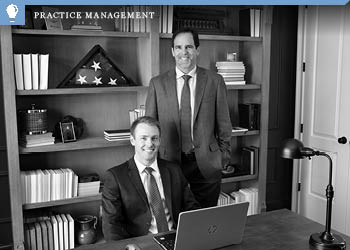Crystal balls and market calls: Seeking a financial fortune teller?
Crystal balls and market calls: Seeking a financial fortune teller?

Successful investing isn’t about “divining” the best investments and times to buy and sell. But a sound quantitative investment methodology is designed to continually put the odds on an investor’s side.
A novice fortune teller eagerly purchased her first crystal ball. On her way home, she accidentally dropped it. She picked it up and thought, “Well, I should’ve seen that coming.”
Every time the market zigs when I thought it would zag, I think of the novice fortune teller. And I bet some clients and financial advisors I work with think the same. Why didn’t he see that coming?
Recently, we saw in the nonfarm payroll report that the number of new jobs created in September was 336,000. But the experts’ consensus before the announcement was for new jobs to total 170,000. A substantial miss. Why didn’t they see that coming? Maybe they needed their own fortune teller.
A glimpse into fortune-telling’s past
Fortune-telling, a practice rooted in ancient civilizations and intertwined with humanity’s quest to understand the future, has a checkered history as a profession. The allure of foreseeing the unknown has drawn individuals to various forms of divination, including astrology, palmistry, tarot card reading, and more. Yet, despite its timeless appeal, fortune-telling as a profession has faced significant challenges and skepticism.
Historically, many cultures have oscillated between embracing and denouncing fortune tellers. In ancient Greece, the Oracle of Delphi was revered and consulted by leaders and laypeople alike. However, with the rise of Christianity in Europe, fortune-telling was often branded as heresy, leading to persecutions and, in some cases, executions of those found practicing it.
In modern times, researchers have scrutinized the profession through the lens of scientific rigor. Numerous studies have aimed to assess the accuracy of fortune-telling methods, often concluding that there’s little to no evidence supporting their efficacy beyond chance.
While still thriving in pockets, the contemporary fortune-telling industry often faces accusations of exploitation, with critics arguing that practitioners prey on vulnerable individuals, offering vague and general predictions that clients can interpret in multiple ways. Despite its rich history and cultural significance, fortune-telling has struggled to establish itself as a consistently reputable profession due to its perceived failures and controversies.
The illusion of forecasts
I often see “fortune-telling” of a different ilk regularly employed on Wall Street and in the financial media. It’s not called fortune-telling. It’s called forecasting.
As investors review media throughout the day—starting with the morning newspaper, then moving on to internet news, daily podcasts, and evening news shows—they are often presented with the idea that valid prediction is both available and accurate.
It all starts with how the media explains current events. No matter what happens in politics, the economy, or daily fluctuations of the stock market, media commentators have a rationale or explanation—and it’s never randomness or market noise. You’ll rarely hear: “This is what happened today, and I don’t know why.” Wow, that reporter would never stay employed!
Nobel Prize-winning author, psychologist, and expert in behavioral economics Daniel Kahneman explains these phenomena and what they lead to in his book “Thinking, Fast and Slow”:
“Everything makes sense in hindsight, a fact that financial pundits exploit every evening as they offer convincing accounts of the day’s events. And we cannot suppress the powerful intuition that what makes sense in hindsight today was predictable yesterday. The illusion that we understand the past fosters overconfidence in our ability to predict the future.”
This overconfidence has fostered a whole industry of forecasters and analysts that appear everywhere and predict everything in both our near-term and distant future.
The reality behind the prophecy
But you may ask, “Wait just a minute, how can these figures with impressive educations, loads of relevant experience, and a string of letters following their names not provide accurate predictions that I can rely on in my daily life?” Laurence J. Peter, a Canadian educator best known for the formulation of the Peter Principle, may have put it best: “An economist is an expert who will know tomorrow why the things they predicted yesterday didn’t happen today.”
Studies in countless disciplines have consistently shown that these experts are, on average, right less than 50% of the time. Furthermore, some studies show that the more qualified the expert, the more overconfident they are and the less accurate their predictions.
In Kahneman’s book, he cites a major study conducted by psychologist Philip Tetlock, which is discussed in Tetlock’s own work “Expert Political Judgement: How Good Is It? How Can We Know?” The study examined over 80,000 predictions on politics over the 15 years ending in 2003 by almost 300 of the world’s top experts from private, government, and academic sources.
Among other requests, researchers asked respondents to assess the likelihood of three possible outcomes for each prediction: 1. No change would occur. 2. More of something would result (like more freedom or more economic growth). 3. Less of that something would result.
The conclusions arising from this massive test? As Kahneman sums it up,
“The results were devastating. The experts performed worse than they would have if they had assigned equal probabilities to each of the three potential outcomes. In other words, people who spend their time and earn their living studying a particular topic produce poorer predictions than dart-throwing monkeys. …”
Closer to our industry, I remember a study by a researcher whose newsletter service I have long respected and subscribed to, Steve LeCompte of CXO Advisory Group. In his research, Steve collected stock market forecasts from scores of famous market gurus for the period 2005–2012. He reviewed almost 6,600 predictions during that period and quantified the accuracy of their forecasts. Steve found that only about 47% were correct. A coin toss would have yielded better results.
Steering away from crystal balls toward evidence and research
I will admit that I play the game. Each time I write a market update, I seek to explain what happened (again with the benefit of hindsight). I draw conclusions from the events and price movements I see happening. And, yes, I often use my expertise and experience to make predictions. But, most importantly, our firm, Flexible Plan Investments (FPI), does not use these predictions to manage client money.
Instead, we use many indicators that we have researched and tested. Using our quantitative methodology, we then apply these indicators to form a strategy, and the computer-driven strategies give our trading department buy, sell, and hold instructions.
Are these instructions predictions? No. We’re not fortune tellers.
First, we base the instructions on probabilities, not certainty. We always try to have the odds on our side for each trade placed on our clients’ behalf. Second, we are not trying to predict the future. Instead, we are trying to respond to the immediate past. Third, we build the ability to adapt and change into each strategy. It happens automatically as the systems absorb new information. Finally, we recommend placing only a portion of an investor’s portfolio into any investment strategy, even those employing several indicators like ours. We also recommend investing in a portfolio with multiple strategies to diversify away from single-strategy risk.
Helping investors tackle ‘fortune-telling thinking’
The world of behavioral psychology has contributed much to how professional investors invest their clients’ portfolios. A colleague passed on this quote from a 2015 blog post by Cognitive Behavioral Therapy Los Angeles called “Cognitive Distortion: Fortune Telling”: “Fortune-telling is a cognitive distortion in which you predict a negative outcome without realistically considering the actual odds of that outcome.”
What we do here at our firm does not fit that definition of fortune-telling. But as the blog post points out, we all do fortune-telling. It forms the basis for our expectations, allowing us to move throughout our day. We expect to reach our destination when entering a car to drive across the city or purchasing a ticket to fly across the country.
But fortune-telling can be dangerous to your well-being, especially your financial well-being, when you employ “fortune-telling thinking” to make investment decisions. An example would be abandoning the stock market in favor of CDs and fixed-term annuities during or after a market correction, as highlighted in our recent research findings.
As the clinic’s blog post cautions:
“Predicting the future becomes the cognitive distortion of fortune-telling, when we assume that some event or events will end badly for us, that we will fail at something or we will be in danger, more as an assumption rather than an educated guess. Of course, some events do have the potential for danger, and we need to be able to assess the risk in those situations. However, fortune-telling is not an accurate assessment based on evidence; it is a global assumption we make without considering the real odds.”
The post provides insight into avoiding this dangerous type of fortune-telling thinking. Below are questions it suggests you ask yourself when you recognize that your mind has started down the path to fortune-telling:
- “What is the evidence for and against your prediction?
- “Examine the function of your worry. Are there benefits to making a pessimistic prediction? Does it prepare you for a difficult task? How about costs? Does your forecast instead make you feel powerless or demoralized? Overly anxious? Given the cost-benefit analysis, is your fortune-telling more helpful or harmful?
- “Consider your track record for making similar predictions.
- “How difficult would it be for your predicted outcome to occur?
- “Are there equally plausible possible outcomes?”
Our firm has created a systematic approach for avoiding these subjective issues:
- We assemble the evidence for our ultimate trading approach using computer-driven, in-depth research.
- We can do a cost-benefit analysis of each strategy, calculating its return and risk.
- We create a long-term track record of the application of each strategy to see if continuous investment in the strategy throughout various market environments is sustainable for likely investors.
- We know the probabilities of success for our strategies and clients’ portfolios. Our monthly OnTarget Monitors communicate those probabilities to our clients and their financial advisors to allow them to evaluate their likely outcomes.
- Finally, we combine many strategies into our recommended portfolios to include equally plausible solutions for varying market environments.
An investment approach beyond predictions
Successful investing isn’t about finding a fortune teller who can divine the best investments and times to buy and sell. Even with artificial intelligence, that’s not possible, given the profession’s current state. Based on sound statistical methodology, we can only seek to put the odds on the investor’s side and then implement them with the objective discipline that computerized investing can deliver.
On the lighter side, I know a friend who decided to see a fortune teller. The way he tells it, he knocked on the door once he arrived at the office, and a voice on the other side replied, “Who’s there?”
Disappointed, he shook his head and returned home.
The opinions expressed in this article are those of the author and the sources cited and do not necessarily represent the views of Proactive Advisor Magazine. This material is presented for educational purposes only.
 Jerry C. Wagner, founder and president of Flexible Plan Investments, Ltd. (FPI), is a leader in the active investment management industry. Since 1981, FPI has focused on preserving and growing capital through a robust active investment approach combined with risk management. FPI is a turnkey asset management program (TAMP), which means advisors can access and combine many risk-managed strategies within a single account. FPI's fee-based separately managed accounts can provide diversified portfolios of actively managed strategies within equity, debt, and alternative asset classes on an array of different platforms. flexibleplan.com
Jerry C. Wagner, founder and president of Flexible Plan Investments, Ltd. (FPI), is a leader in the active investment management industry. Since 1981, FPI has focused on preserving and growing capital through a robust active investment approach combined with risk management. FPI is a turnkey asset management program (TAMP), which means advisors can access and combine many risk-managed strategies within a single account. FPI's fee-based separately managed accounts can provide diversified portfolios of actively managed strategies within equity, debt, and alternative asset classes on an array of different platforms. flexibleplan.com
RECENT POSTS








